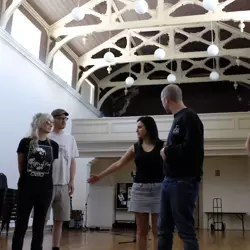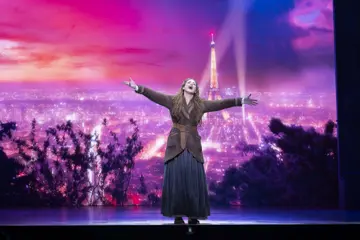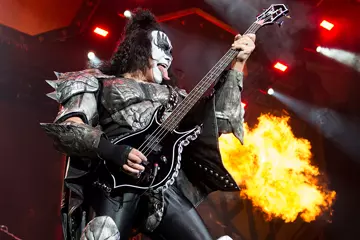 Harmony
HarmonyBack in 2011 Melbourne six-piece Harmony introduced their distinct aesthetic to the world in the shape of their eponymous debut long-player, albeit in a comparatively rudimentary form. The outfit was the brainchild of The Nation Blue frontman Tom Lyngcoln, who envisioned a ragged three-piece band whose bleak outpourings were augmented by harmonic female vocals, but at the time of recording Harmony many of the band members were literally just being introduced for the first time as they were ushered into the fold one by one. Nonetheless the potential strength of the dynamic was clearly evident and the results, even at that nascent stage, bordered on mesmerising.
Fast forward three years and Harmony have progressed from a tantalising concept to a confident and fully-fledged concern, their second long-player Carpetbombing a massive leap forward in both cohesion and execution. The contrast between Lyngcoln's malevolent guitar and guttural voice – rhythmically abetted by his wife Alex Kastaniotis on drums and former-Mclusky bassist Jon Chapple – and the gorgeous choir effect provided by the meshed voices of Amanda Roff, Quinn Veldhuis and Erica Dunn is stunningly evocative, the songs' inherent foreboding menace offset dramatically by the innate beauty of their vocal counterparts.
“I had a lot clearer idea this time because I knew what the girls were capable of,” Lyngcoln attests to how experience has broadened Harmony's peculiar capabilities. “On the last one that was a total shock in terms of how they were able to harmonise and what they could actually do – that's a level of musicality that's well above me – so this time I knew I had three particular weapons in the arsenal that I could pull out. That made the writing a little less desperate, because I was pretty comfortable with what I had and knew that I could simplify things a lot more and not clutter things up – leave space for them to do their thing. The title came really early, so I just used that as a guide in regards to what I wanted to do which was basically a cross-stitch between a horrible, gnarly domestic situation and a city form of warfare.”
Such grim subject matter seems a rather odd conceptual road to follow, until you take Lyngcoln's academic history into account.
“I pretty much ran with that whole 'carpetbombing' theory – the record lyrically and thematically and also aurally adheres to that as much as possible,” he continues. “There are little spot fires of different things, but the major theme arises because I studied terrorism at uni and I was going to go into the field of conflict resolution – I didn't do that ultimately because, (a) I'm too much of a dumb prick to really be helping other people when I can't help myself; and (b) I finished my studies in 2000 and by 2001 every single bit of info I'd learned was public knowledge or had been printed in the papers after 9/11. I had to use all that somewhere so bombing lyrics always come up – it's the easiest thing for me to write about, and you can extrapolate on it pretty nicely. I managed to get a whole record out of things that are essentially related to that theme.”
Don't miss a beat with our FREE daily newsletter
And while notions of terrorism aren't usually synonymous with the Antipodes, Carpetbombing has a distinctly Australian feel – Lyngcoln believes that this is partly due to Harmony's aesthetic and partly because of the band's local lineage.
“There's some pretty risky vocal endeavours on this record – the first one had some kinda clichéd backing things at moments, but this one's pretty intense,” he reflects. “The majority of harmonies come out of the African-American churches in the south of America – at least the ones that are most commonly heard in the reference of pop music – so we kind of go out of our way to avoid that sound when we can. There's some weird-sounding baroque things on this record, and that's basically trying to avoid stereotypes and clichés with the vocals – it's a really hard thing to do, but it's natural because I've got such a bogan voice to not have the girls be too sugary sweet and saccharine. You can't do that American-style harmonising with my voice – it just sounds weird – so they feed off my vocals to a degree, which is a gross injustice but we do build it up in that way so it doesn't sound like much else that's out there.
“There's a pedigree there that borrows a lot from the Dirty Three and things like The Drones and Beasts Of Bourbon and X – who are all well-established in the Australian psyche. I love Australian punk rock and that stuff all inevitably ends up in there despite me trying to make it sound as different as possible – it's always going to filter down.”















